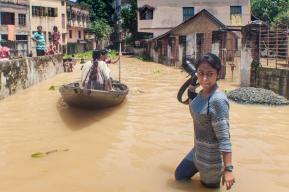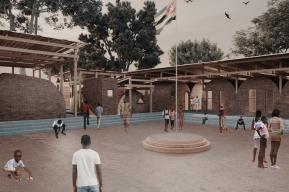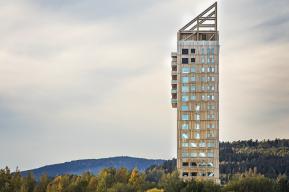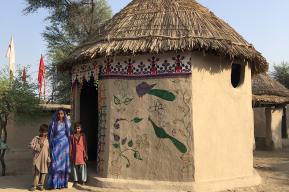观点
爱德华·诺顿:“历史不会善待否认事实的人”

生物多样性的减少危及到人类的未来。然而,尽管一再受到警告,我们仍然“为了短期盈利而逐底竞争”,“对其他生物造成了严重破坏”。
爱德华·诺顿(Edward Norton),演员、电影制作人、活动家、联合国生物多样性亲善大使,呼吁作出改变。
米拉·伊布拉欣莫娃(Mila Ibrahimova,联合国教科文组织)担任采访
眼下濒临灭绝的动植物物种已达到一百万。对于此种物种大灭绝的威胁,您作何感想?
我感到万分沮丧,又极为愤怒,因为对这个问题的更恰当的表述是:“对于人类活动导致的物种大灭绝的威胁,您作何感想?”了解到人类正在对其他物种造成如此严重的大规模破坏时,我们只能黯然神伤。但必须承认,如今,我们对这种影响的认识是建立在一种深入的、由数据支持的科学确认的框架之上的。
然而,在所有这些证据(包括关于这种行为威胁到我们生活方式和经济稳定的明显证据)面前,我们依然我行我素——绝大多数行业仍然为了短期盈利而逐底竞争。这种“反正我们终归会死,不如争取在短期内实现经济利益最大化,把这个问题留给下一代的下一代去解决”的态度……让我感到怒不可遏。历史是不会善待那些为了私利而否认事实、混淆视听的人,我们必须唤醒他们。
您一直致力于保护生物多样性,从中有什么收获?
“生物多样性”这个说法有时候具有学术色彩。我喜欢称之为“生命的丰富性”,这样既包含了我们这个地球上神奇复杂的生命之网(生命具象化为野生生物的真正奇迹)对全人类而言的精神价值,又承认了整个经济都与健康的生物多样性息息相关。
我们的整个经济都与健康的生物多样性息息相关。
我喜欢蜜蜂和蝴蝶的例子。即使投资一万亿美元为作物开发人工授粉技术,也无法复制授粉昆虫免费为人类进行的授粉过程。但是,我们却宁可让化学公司继续生产杀虫剂,从而导致授粉昆虫数量锐减。无论从经济角度还是粮食安全角度来看,此举都无异于自杀。
气候变化及其恶果主要影响着世界上最贫穷的人。您是否亲眼目睹过气候变化和生物多样性丧失?
是的,在很多地方,以多种方式。我曾经在撒哈拉以南非洲待过很长时间,那里的牧民和农民遭受着旱涝周期的日益加快,这是由全球变暖和森林砍伐直接导致的。在印度尼西亚珊瑚礁三角区(我父亲曾经在那里与大自然保护协会合作多年)之类的地方,过度捕捞正在摧毁许多贫困社区的生计。西非也是如出一辙。过度捕捞加剧了粮食不安全问题,导致人们捕杀更多的野生动物。这直接导致更多的人畜共患疾病(动物传染给人类的疾病)病毒的传播,正如我们眼下所经历的那样,无人幸免。
您身为联合国生物多样性亲善大使,首要任务之一是增加“人们对人类福祉在根本上与生物多样性密不可分这一事实的关注”。您觉得人们听到您的呼声了吗?
有时候,虽然世界各地关于这些问题的呼声越来越高,但是一些根深蒂固的行业却阻碍了我们需要的政策转变,妨碍了大胆采取行动的政治意愿,让人非常懊恼。
我并没有“专门”从认识角度真正地评估“我的成功”。我认为,自己只是一代人中芸芸众生的一员,竭力坚称这已成为当今时代最重要的问题。我确实认为,今后世世代代都会更深入地认识,更密切地关注这个问题。
在提高意识方面,您最大的成功是什么?
当我多年来一直在做的事情,比如(肯尼亚)库鲁森林碳项目(Chyulu Forest Carbon Project)的开发,作为目标得以实现时,我自己就会很有成就感。这个项目花了我们六年多的时间——马赛荒野保护信托基金与保护国际基金会之间的合作——才使该项目得以认证为REDD+/VCS(核证碳标准)*项目,每年产生约65万吨的碳抵消。现在,我们正在出售这些信用额,来资助社区保护和发展。这是实实在在的成功。
您曾周游世界,致力于提高人们的意识,采用可持续的生活方式来保护地球。一路走来,您从接触过的人身上学到了什么?
我了解到,这是一项真正得到了不同文化、种族、经济和宗教的人口群体的理解的挑战。它超越了这些不同,将我们团结在一起。我在肯尼亚有一些年轻的马赛族朋友,他们与我的印度尼西亚朋友、美国朋友完全一样,对此充满热情。这让我看到了希望。
可持续生活挑战超越了所有不同,将我们团结在一起。
生物多样性和生态系统服务政府间科学与政策平台(生物多样性平台,IPBES)报告认为,按照目前的发展轨迹,无法实现保护自然的全球目标。我们如何作出改变?
我们的国家政治领导人必须停止为最终无关紧要的渐进措施邀功。我们需要制定经济政策,迫使造成破坏的人们承担因碳和环境退化而产生的各种形式的巨大社会成本。除非我们不再将这些成本社会化,并让“自由市场”承担其真正的营商成本,否则,不可持续的做法就不会告终。
最后,您如何看待未来前景?
未来令人生畏,但我们必须意志坚定。我认为,人类依靠聪明才智,一次又一次为错综复杂的问题提供了解决方案,而且这些办法往往是以一种甚至在问题出现之前都无法预测的方式。我们一定能够做到。
*“REDD+”代表各国为减少森林砍伐和森林退化所产生的排放量,以及促进森林养护、可持续管理和增加森林碳储量所做的努力。核证碳标准(Verra或VCS)是证明碳排放量减少的标准。
详细了解教科文组织和娇兰如何通过“女性为蜜蜂”计划保护生物多样性。
拓展阅读:
《气候变化的伦理挑战》,联合国教科文组织《信使》,2019年7-9月。
《欢迎来到人类世!》,联合国教科文组织《信使》,2018年4-6月。
《气候变化:我们将走向何方?》,联合国教科文组织《信使》,2009年12月。
《人与自然:和谐相处》,联合国教科文组织《信使》,2009年6月。
《生物多样性:终身的朋友》,联合国教科文组织《信使》,2000年5月。
订阅联合国教科文组织《信使》,阅读发人深省的时事文章,数字版免费。
在社交网络上关注联合国教科文组织《信使》:微博、微信公众号“联合国教科文信使”、Twitter、Facebook、Instagram。
Interview by Mila Ibrahimova
UNESCO
One million animal and plant species are threatened with extinction. How does the threat of this mass extinction make you feel on a personal level?
Dismayed and angry, because the question is, more appropriately: ‘How does the threat of mass extinction driven by human activity make you feel?’ One can only be dismayed to learn what a violent and extensive destruction we’re wreaking on other living things. But it has to be acknowledged that we’ve now known about this impact in a deep, data-supported framework of confirming science.
And yet we continue, in the face of all the evidence, including the clear evidence that this behaviour threatens the stability of our way of life and our economies – the large majority of our industries continue the race to the bottom for the short-term bottom line. This “I’ll be dead, you’ll be dead, so let’s financially maximize in the short term and leave the problem to our grandkids” attitude... that’s what makes me angry. History will not be kind to those denying and obfuscating for personal gain, and we need to call them out.
What have you learned from your commitment to protect biodiversity?
Biodiversity sometimes has an academic ring to it. I like to characterize it as the “richness of life”, because that encompasses both the spiritual value, to all of us, of the magically complex web of life on this planet that we live on – the true miracle of life’s wild incarnations – while also acknowledging that our whole economy is tied to healthy biodiversity.
Our whole economy is tied to healthy biodiversity
I like the example of bees and butterflies. A trillion dollars of investment in a human technology to pollinate our crops cannot replicate what pollinators do for us for free. But we’d rather let chemical companies keep making pesticides that are causing a collapse of the populations of pollinators. This is suicide, both economically and in terms of food security.
Climate change and its consequences primarily affect the world’s poorest. Have you personally witnessed climate change and biodiversity loss?
Yes, in many places and many ways. Pastoralist herders and farmers in sub-Saharan Africa – where I’ve spent a lot of time – are facing intensifying cycles of drought and floods directly stemming from global warming and the clearing of forests. And in places like the Coral Triangle of Indonesia – where my father worked with the Nature Conservancy for many years – overfishing is devastating the livelihoods of many poor communities. Same in West Africa. And that increase of food insecurity driven by overfishing is leading to more killing of wildlife. This directly leads to more exposure to the zoonotic [diseases passed from animals to humans] transfer of viruses which – as we’re now experiencing – affects everyone.
One of your top priorities as UN Goodwill Ambassador for Biodiversity is to increase “people’s focus on the fact that human well-being is intertwined fundamentally with biodiversity”. Do you feel that your voice is being heard?
Sometimes it’s very frustrating to feel that voices all over the world are getting very loud about these issues and yet, the political will to act boldly is stymied by entrenched industries who put the brakes on the policy shift we need.
I don’t really assess ‘my success specifically’ in terms of awareness. I look at myself as part of a generational chorus of voices trying to insist that this becomes the most important issue of our time. And I do think awareness and concern grows greater in each subsequent generational demographic.
What have been your greatest successes in terms of raising awareness?
I feel personally successful when something I’ve been working on for many years, like the development of the Chyulu Forest Carbon Project [in Kenya], is realized as a goal. It took us over six years of work – a partnership between the Maasai Wilderness Conservation Trust and Conservation International – to get that project certified as a REDD+/VCS (Verified Carbon Standard)* project, generating about 650,000 tons of offset per year. And now we’re selling those credits to fund community conservation and development. That’s a tangible success.
You have travelled the world to raise awareness about making the way we live sustainable for our planet. What have you learned from the people you met along the way?
I’ve learned that this is a challenge that is truly understood across cultural, racial, economic, and religious lines. It transcends all of that and unites us. I have young Maasai friends in Kenya who are every bit as passionate about this as my Indonesian friends and my American friends. That gives me hope.
The challenge of living sustainably transcends all differences, and unites us
The Intergovernmental Science-Policy Platform on Biodiversity and Ecosystem Services (IPBES) report finds that global goals for nature conservation cannot be met by current trajectories. How do we change course?
Our national political leaders have to stop taking credit for incremental measures that are ultimately irrelevant. We need an economic policy that forces the massive social cost of carbon and environmental degradation in all forms to be borne by those doing the damage. Until we stop socializing those costs and make the “free market” bear its authentic costs of doing business, non-sustainable practices will not end.
Finally, how do you see the future?
It’s daunting, but we have to remain determined. And I think human ingenuity has created solutions to complex problems over and over again – often in ways that were unpredictable even just on the cusp of their emergence. We can do it.
*REDD+ stands for countries' efforts to reduce emissions from deforestation and forest degradation, and foster conservation, sustainable management of forests, and enhancement of forest carbon stocks. The Verified Carbon Standard, Verra or VCS, is a standard for certifying carbon emission reductions.








